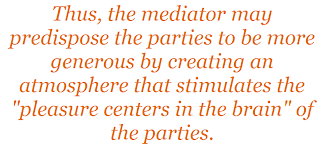Should mediators provide cookies and coffee to parties during mediation? The question seems trivial. Yet reading the new book by Ruwen Ogien entitled "The Influence of the smell of croissants on human kindness" might make you change your mind. The author reports several scientific experiments that demonstrate that to stimulate the "pleasure centers in the brain" of a person predisposes him to be generous. For example, in an experiment, the good smell of croissants made people more generous!
Although Ruwen Ogien's book does not deal with mediation, one may be tempted to apply his findings to the mediation process. Thus, the mediator may predispose the parties to be more generous by creating an atmosphere that stimulates the "pleasure centers in the brain" of the parties. Coffee, biscuits, comfortable chairs, a cozy atmosphere, etc. In addition, the author also tells us that stimulating the "displeasure centers" of the brain predisposed people to be closed-off and somewhat uncooperative. You're not convinced? On your next mediation, allow the conflicting parties to wait in the same waiting room (i.e stimulate the displeasure center). You will have a rather difficult mediation.
I've made the mistake of having the parties wait in the same room and I can assure you that those mediations have been more difficult than when parties were separated while waiting. Personally, I've never explored the impact of biscuits on mediation but I'm seriously thinking about it!
Reference
- Ogien, Ruwen. 2011. L’Influence de l’odeur des croissants chauds sur la bonté humaine. Paris : Grasset, 336 pages.

Comments